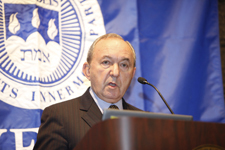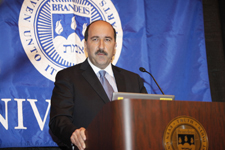Justice Richard Goldstone and former Israeli ambassador Dore Gold discuss the U.N. Gaza report
Justice Richard Goldstone and former Israeli ambassador to the United Nations Dore Gold engaged in a pointed, searching discussion of the Palestinian-Israeli conflict in Gaza on Nov. 5 before a rapt audience of Brandeis University students, faculty, members of the general public, and international media, including The Boston Globe, The Jerusalem Post, Al Jazeera, Israel National News, New England Cable News, YNet, Public Radio International's "The World," and Reuters.
It was the first time that Goldstone, whose name has become synonymous with the U.N. Human Rights Council's fact-finding report on the conflict, engaged in a public forum with a senior Israeli political figure over widespread criticism of the report among supporters of Israel.
See introductory remarks by President Jehuda Reinharz.
The report states that there is evidence that Israeli and Palestinian militaries committed war crime and possibly crimes during fighting in and around Gaza that peaked over a three week period last December and January. It recommended that both sides undertake credible investigations of their actions. Neither side has done so yet.
 |
| Richard Goldstone addresses the forum. |
The overflow crowd at Brandeis and thousands who viewed the event on a live online heard the two men agree that the United Nations is broadly biased against Israel and disagree over whether the Jewish state should have participated in the UN probe of the 23-day clash last December and January that devastated much of the Palestinian territory.
They also disagreed sharply over core topics of the fact-finding mission – particularly whether Israel deliberately targeted non-combatants in Gaza as a way of punishing the population there for its support of the Islamic extremist group Hamas, which launched thousands of rockets from Gaza into southern Israel in recent years. Launches were escalating rapidly at the time Israeli forces entered the territory and engaged Palestinian fighters last December.
Gold asserted that the long history of animus toward Israel was ample reason for the Jewish state to refuse to cooperate with the U.N. fact- finding mission, whose report is currently the subject of a major debate in the U.N. General Assembly.
Goldstone, who headed the fact-finding mission and who also is chairman of the advisory board of Brandeis' International Center for Ethics, Justice and Public Life, agreed that there was a long history of U.N. hostility toward Israel, but said the mandate he was given to investigate the Gaza fighting was the most even-handed U.N. approach to the Israeli-Palestinian conflict ever, and should have been seized upon by Israel as an opportunity to have its views and evidence heard by the world.
 |
| Dore Gold delivers his presentation. |
The resolution was formally repealed in 1991, but its sentiments were strongly endorsed by many U.N. members who participated in the UN conference on racism held in Durban, South Africa, in 2001.
Goldstone said he and other members of the U.N. fact-finding group "would have liked to meet with the victims" of attacks on Israel launched by the Islamist organization Hamas, but was prevented by the Israeli government from doing so. "I pleaded with the Israeli government" to cooperate with the U.N. mission, Goldstone said, but the fact-finding committee was not allowed to visit southern Israel – the area principally affected by Hamas rocket attacks.
"Let me be absolutely clear," Goldstone said. "International law allows, and indeed requires, Israel to defend its citizens. Hamas and others committed serious war crimes against the citizens of southern Israel…. " However, he said, there is evidence that Israel's policy in the latest fighting was to direct its military might against civilians and civilian infrastructure as a way of deterring future rocket attacks, a policy he said "completely undermines the foundations of international law."
"It is a matter of regret that we were not informed of the views of the Government of Israel and the IDF," the Israel Defense Forces, Goldstone said.





